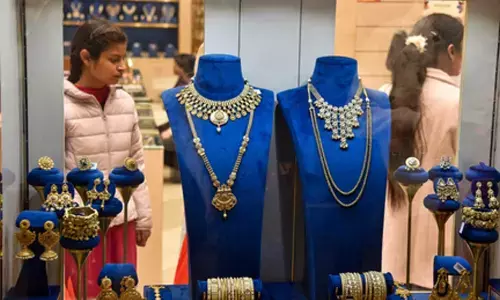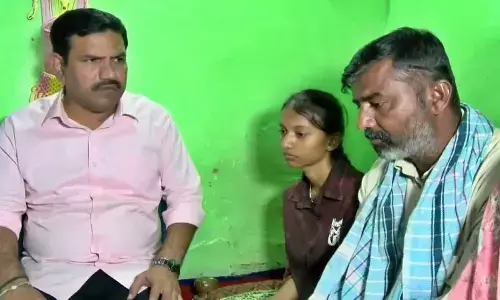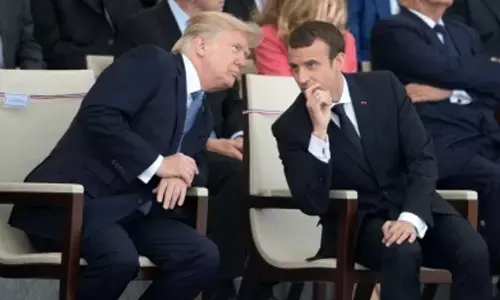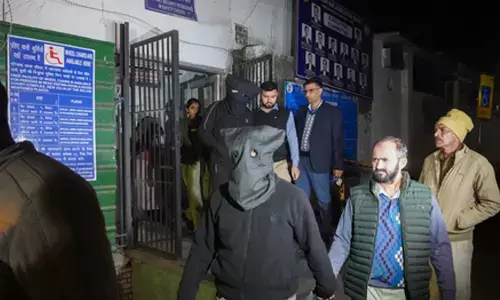After tripartite accord, TMP ends 5-day-long sit-in in Tripura
Share :

A day after signing a tripartite agreement with the Centre and the Tripura government, the Tipra Motha Party (TMP) on Sunday ended its 5-day-long demonstration at Hathai Kotor on National Highway-8, the lifeline of the state.
A day after signing a tripartite agreement with the Centre and the Tripura government, the Tipra Motha Party (TMP) on Sunday ended its 5-day-long demonstration at Hathai Kotor on National Highway-8, the lifeline of the state.
The TMP, led by former royal scion Pradyot Bikram Manikya Deb Barman, has been agitating for constitutional solutions to the tribals’ economic and political issues for the past few years and on Saturday, signed the tripartite agreement in New Delhi in presence of Union Home Minister Amit Shah, Tripura Chief Minister Manik Saha and others.
Addressing a mammoth gathering of tribal men and women at Hathai Kotor (Baramura hill), Deb Barman said that with the signing of the tripartite agreement, "we have achieved 60 per cent and with our hard work we would achieve the remaining 40 per cent".
"Our struggle is to protect the land and political rights, economic development, identity, culture, language etc of the indigenous people and to ensure a better life of the future generations. We are not against the non-tribals or any other community. We would not deprive others, we are only to uplift the tribals," he said before the end of the demonstration, which began on February 28 to press for the TMP’s demands.
The TMP chief quoted the Union Home Minister as saying that the agreement was signed to respect history, correct past mistakes, and consider present-day realities to look into a bright future for Tripura.
Deb Barman, a few hours after launching the demonstrations at Hathai Kotor on February 28, claimed that he was called by the Central government to Delhi to discuss their demands and accordingly went there, with his other party leaders.
"We have to implement our land rights, funding pattern, language (script) issue, political representation and also restore our historical and cultural pride. What we are asking is as per the Constitution. We want the government to fulfill the tribals' constitutional and land rights-related issues," the TMP leader told the media.
Tribals constitute one-third of Tripura’s four-million population. According to the tripartite agreement, a joint working group/committee would be formed to work out and implement the mutually-agreed points in a time-bound manner to ensure a honourable solution.
“…Government of India, government of Tripura and TIPRA (TMP) agreed to amicably resolve all issues of the indigenous people of Tripura relating to history, land rights, political rights, economic development, identity, culture, language etc.,” the agreement said.
Besides Deb Barman, senior TMP leader Animesh Debbarma, TMP President Bijoy Kumar Hrangkhawl, Tripura Chief Secretary J.K. Sinha, and Home Ministry’s Additional Secretary (NE) Piyush Goyal signed the tripartite agreement.
Ever since the TMP wrested power in the Tripura Tribal Areas Autonomous District Council (TTAADC) in April 2021, it has been demanding 'Greater Tipraland' or a separate state for the tribals under Articles 2 and 3 of the Constitution. However, the demand had been strongly opposed by the ruling BJP, the opposition Left Front, Congress, Trinamool Congress and other parties.
The TTAADC, which has jurisdiction over two-third of Tripura's 10,491 sq km area, and is home to over 12,16,000 people, of which around 84 per cent are tribals, is, in terms of its political significance, the second-most important constitutional body after the Assembly.








